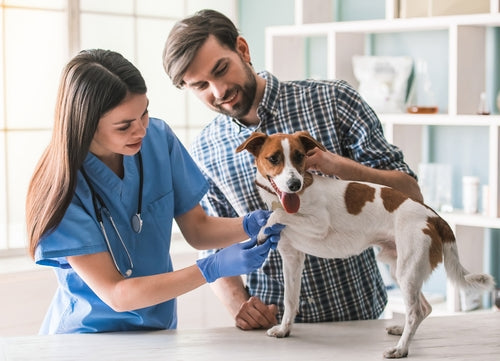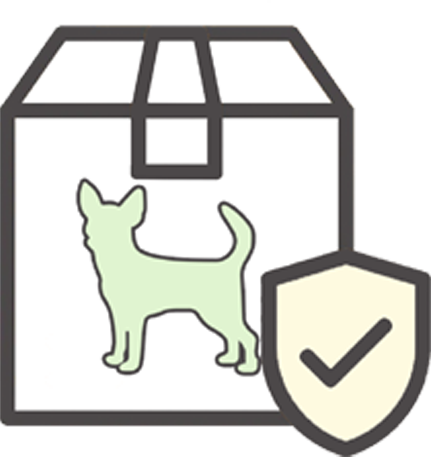How To Save On Veterinary Bills
Friday, June 01, 2018 01:34:11 PM America/Los_Angeles
Dogs are not only man’s best friend, most consider them as family members. Although we can usually tell if our dogs aren’t feeling well, it can be frustrating not knowing what is wrong or what may be causing discomfort. This uncertainty can often cause us to bring our pets into the vet at the first sign of a health problem or behavioral issue. While this helps to ease our minds, it can have a negative effect on our wallets. Vet bills can start to add up and may cause you to start thinking, does my dog really need to go to the vet for this? Luckily, we’ve found some tips that can help you understand the right times to visit the vet and how to save money on those expensive vet bills.
Don’t be afraid to shop around. Depending on where you live, there should be a variety of options for veterinary services in your area. If your pet is due for a vaccination, try looking for a pop-up vaccination center in your area. These are usually found in pet stores and offer very affordable vaccinations. If your pet is just going in for a check-up or a minor health issue, try avoiding specialty vet offices or emergency vet clinics, which can typically be more expensive than general health vets. A veterinary school that offers discounted services with studying vets is also a great way to save money on dog care.

By VGstockstudio via Shutterstock
Try to maintain a healthy lifestyle for your pet. Small changes in your dog’s daily routine can help you better manage their health and keep them away from the vet. Frequent walks and trips to the dog park are great ways for your dog to get some exercise and maintain a healthy weight. Invest in good teeth cleaning products for your dog, including a toothbrush and dental chews. Good doggy dental health actually helps avoid disease caused by bad dental hygiene and can extend their life. Also, be sure to check your dog regularly for fleas and ticks. Fleas and ticks can spread disease and need to be treated right away to avoid them multiplying and spreading.
Look into other options for your pet before going to the vet. Frequent doggy accidents in the house can be troubling. If you’re having a reoccuring problem with housebreaking your pet, trying sticking to a potty training system before consulting with your vet. An indoor dog potty, such as DoggieLawn, is a great way to start training your dog to use the bathroom is a specific place. DoggieLawn is essentially fake grass that is designed to stay inside your home and act as a dog bathroom when needed. Be patient with your dog and allow some time for your dog to learn the basics of potty training.
Stay on top of preventative maintenance and vaccinations. Preventative flea and tick medication can help prevent disease and is relatively inexpensive. Heartworm medication is also a great preventative tool and can be purchased online or at your local pet store for much less than purchasing through your veterinarian. Vaccinations also help your dog avoid disease and illness, and are usually only required every 3 years, depending on the vaccination. There are also at home dog health tests that can be purchased for much less than a vet bill that test for heartworms, diabetes, infection, and more.
Consider other options for purchasing pet medications. Although your vet will discourage you from buying medication elsewhere, many pet stores in your local area or online will offer the same pet medications for much less than what your vet is charging. Don’t be afraid to ask for the recommended medications written down and let your vet know you will contact them if you need to purchase through them. You never have an obligation to purchase the recommended medication through your vet and you’ll end up saving yourself hundreds of dollars by looking around elsewhere.
Think about investing in pet insurance. Pet insurance is useful for pets who may be at risk for health problems or need multiple check-ups throughout the year. Most pet insurance is offered at a monthly rate and include certain services and procedures. There are often many exclusions, so be sure to look for a company that is transparent in what costs they cover and determine if this option may be right for your pet.
Don’t be afraid to ask for a written estimate of services before agreeing to them. If you are unsure about whether or not you can afford a service for your pet, ask your vet for an estimate beforehand. This will help you understand the cost of a vet visit before you commit to it. If you find that the service is much more expensive than you anticipated, consider scheduling the service at a later date so that you can plan for the expense. This also gives you the option to consult with other vet offices to compare prices.
Be open with your veterinarian about your budget. Your vet is a person, too, and will understand if you explain that you have a tight budget for your pet. Ask your vet about different options that are more affordable and question if certain medications and services are absolutely necessary during visits. They should be able to help guide you on health care options that will maintain your dog’s health but also align with your budget.
These are just a few of the ways you can save money on vet bills. The best way to avoid spending money at the vet is to set up a healthy lifestyle for your pet and take measures to make their life as enjoyable and comfortable as possible.

